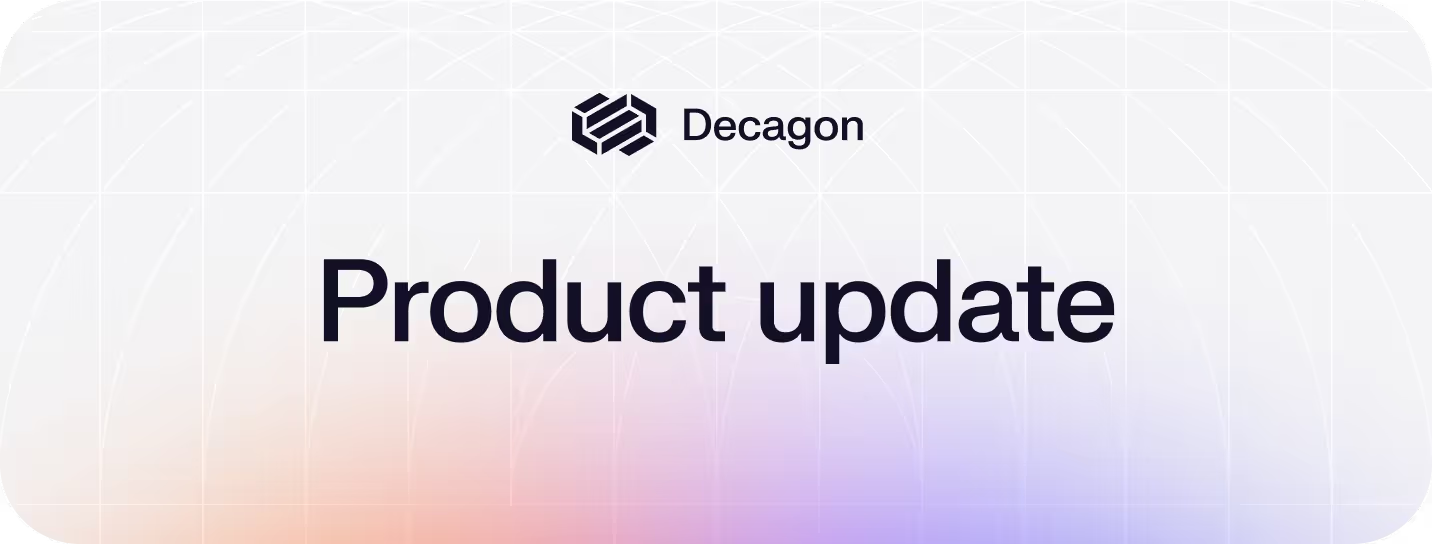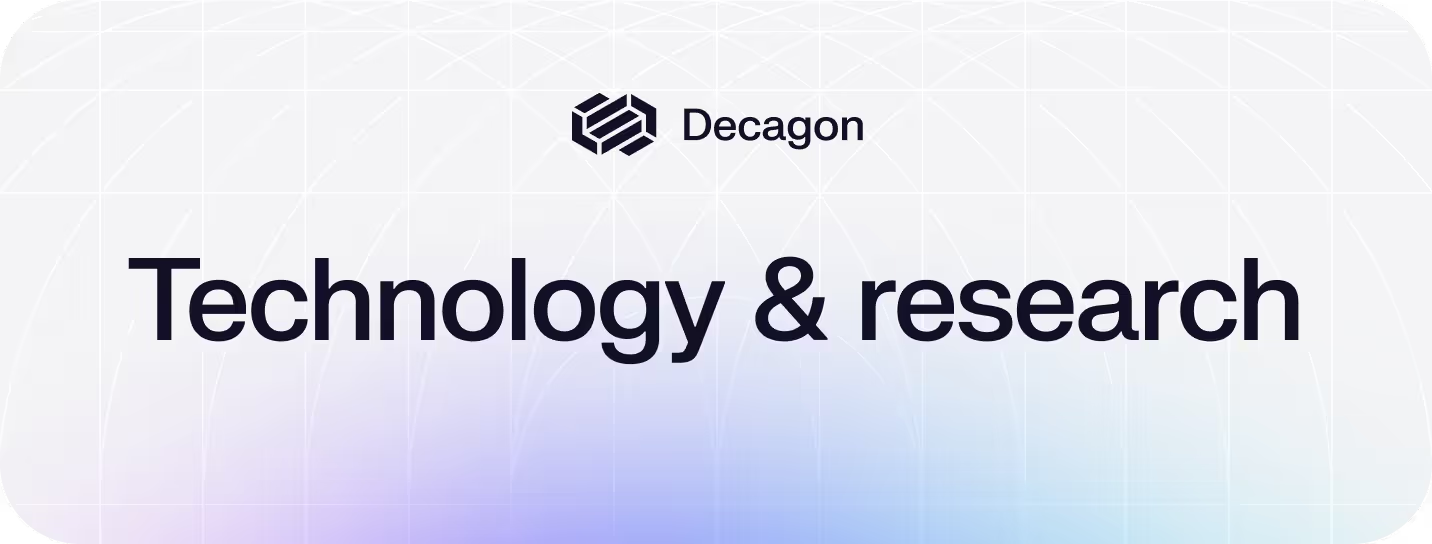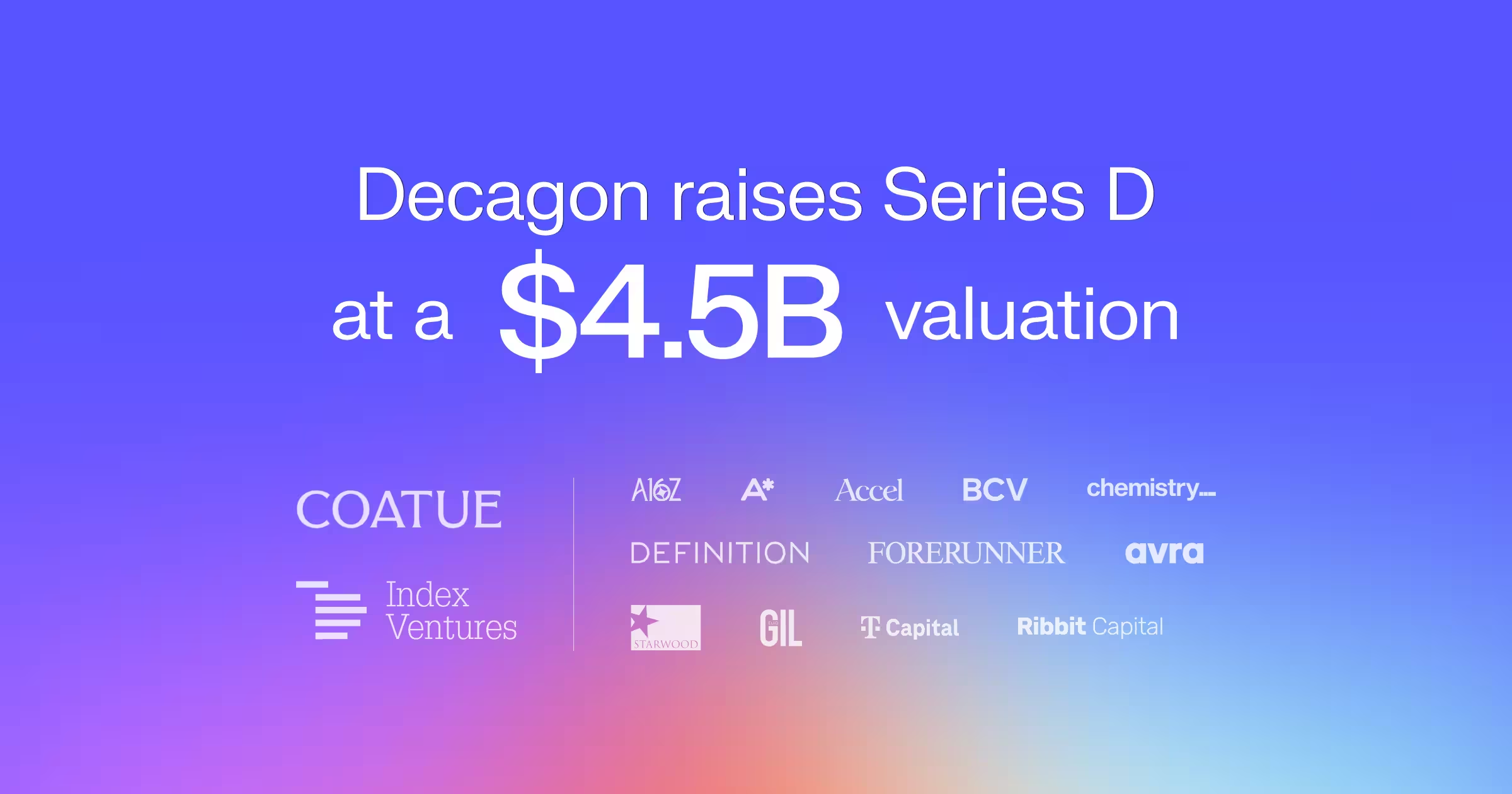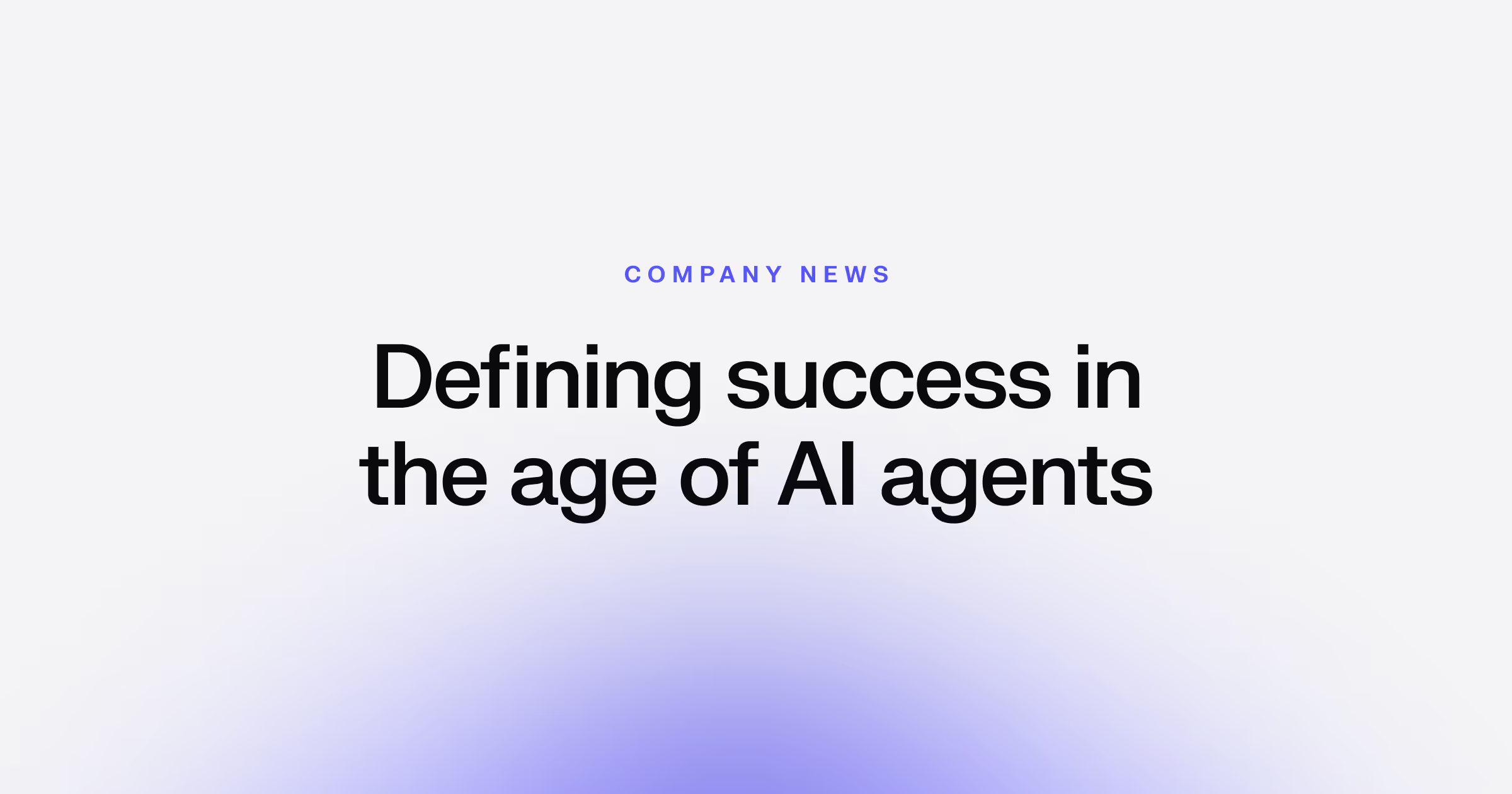Guide to AI support technology
Explore how AI support technology can move from risky automation to confidence-gated systems.

Business leaders have been stuck with a frustrating choice for a while: either rely on simple chatbots that deflect basic questions or risk deploying more powerful AI that could go off-script, frustrating customers and damaging brand trust.
Now, it’s essential to move from AI that just answers questions to AI that reliably executes tasks.
Decagon does this with our proprietary Agent Operating Procedures (AOPs). This framework transforms AI from a basic FAQ tool into an operational one, empowering agents to execute complex, multi-step workflows with precision. For instance, at Notion, Decagon’s AI agents now resolve millions of annual queries and resolve them 34% faster.
Achieving this level of sophisticated, safe automation is a fundamental strategic choice, with industry leaders opting for a white-glove partnership over a DIY approach. This ensures the system is architected for specific enterprise needs, with robust governance built in from the start.
In this guide, let’s talk a bit about modern AI support technology, giving you a practical framework for building a system that doesn’t just answer questions, but gets work done.
How AI support technology differs from traditional support
For decades, the customer support experience has followed a familiar script. You contact a helpdesk, wait for an available agent, and then that person manually navigates different systems to find your answer. While traditional support teams are full of dedicated experts, they operate within a framework of human limitations.
Modern AI support technology goes beyond digitizing this old model to completely rebuild it. Among other benefits, this creates a fundamental difference in capability that directly impacts speed. Let's break down the key shifts.
Traditional support is defined by:
- Fixed hours. Support is typically available only during standard business hours.
- One-to-one interactions. A human agent can only help one customer at a time.
- Manual processes. Agents often toggle between multiple screens and databases to resolve a single issue.
- Script-based answers. Responses are often limited to pre-written scripts, making it hard to solve unique problems.
Modern AI support delivers:
- 24/7 availability. The system is always on, providing instant help to customers anytime, anywhere.
- Massive scale. An AI agent can handle thousands of conversations simultaneously without any drop in quality.
- Direct system integration. The AI connects directly to your core business tools to take immediate action.
- Dynamic reasoning. Instead of following a rigid script, the AI can analyze a situation and determine the best path to a resolution.
The most significant leap forward is the ability for AI to execute end-to-end workflows. A traditional agent might tell you how to request a refund. An AI agent, powered by Decagon’s AOPs, can actually process that refund for you on the spot.
AOPs create a unique hybrid system where your team is always in control. Business users, like support managers, write instructions for the AI in natural, everyday language. Meanwhile, engineers maintain the technical and security controls, creating a secure environment where the AI can work. This means the AI isn't just finding information, but securely updating subscriptions, resetting passwords, and completing complex tasks without a human ever needing to switch screens.
This evolution naturally changes how we measure success. The focus shifts from human-centric metrics to system-wide effectiveness. Instead of tracking average handle time, leading companies now focus on first-contact resolution rate. Instead of worrying about ticket volume, they measure the overall automation percentage, celebrating how many issues can be solved instantly and accurately.
How do I train an AI chatbot using my own company's documents and website information?
A generic, off-the-shelf AI is like a new hire on their first day – it has potential, but it doesn't know anything specific about your business, your products, or your customers. The real power of AI support technology is unlocked when it’s trained on your unique company knowledge, creating a living, learning brain for your support operations.
Step 1: Building a central knowledge base
First, the AI needs its library. Your company's information is likely spread across many places: technical documents, website FAQs, internal wikis, and even your CRM. The initial step, known as knowledge ingestion, is a process where a system like Decagon unifies all of this scattered content. It’s organized into a single, intelligent knowledge graph that the AI agents can reference in an instant. This creates one source of truth, ensuring every answer is consistent and accurate.
Step 2: Preparing your data for success
Your AI needs high-quality data to learn effectively. The system is only as good as the information it's given. Key steps in data preparation include:
- Creating clean documentation. Ensure your help articles and guides are clear, accurate, and easy to understand.
- Using consistent terminology. Call products, features, and processes by the same name across all documents.
- Performing regular content audits. Periodically review and remove outdated or irrelevant information.
- Implementing version control. Make sure the AI is always referencing the most current version of any document.
Step 3: Enabling continuous, on-the-job learning
The most effective AI systems learn and improve continuously from every interaction. This is where a feedback loop comes into play. With tools like Decagon's Agent Assist, the AI observes how your expert human agents handle complex queries. It learns from their responses and actions, constantly refining its own understanding.
This creates a powerful, self-improving cycle. The AI handles a query, a human provides feedback if needed, and the system incorporates that learning to perform even better the next time.
Step 4: Applying governance and safety rules
Giving an AI access to your company's knowledge requires strong guardrails. Governance is a critical layer of the training process that ensures the AI operates safely and securely. This involves establishing controls over data access, setting information hierarchies, and ensuring the AI only uses approved sources.
With this structured approach, you transform a generic chatbot into an expert system that is deeply integrated with your business, constantly improving, and, most importantly, trusted to interact with your customers.
How does an AI support system handle multiple channels?
Modern AI support handles multiple channels by using a single, unified AI engine to power every conversation, ensuring a consistent and seamless customer journey.
Customers expect to get help wherever they are, on your website, through a messaging app, via email, or over the phone. A common point of failure for many companies is creating a disjointed experience, forcing customers to repeat their issue every time they switch channels.
Instead of using separate bots for your website, messages, and email, a true AI support system operates from one central intelligence. This unified AI engine has access to the same knowledge and customer history regardless of the communication channel. As a result, the customer receives the same accurate answer whether they type a question into a chat window or send an email, because the same smart system is behind both.
A frequent question from business leaders is whether AI support can go beyond text. The answer is a definitive yes. Decagon’s AI support agents can manage complex phone conversations with remarkable clarity.
This technology enables:
- Natural conversation flow. The AI can understand the nuances of human speech, allowing for a back-and-forth dialogue that doesn't sound robotic.
- Emotion detection. The system can recognize a customer's tone of voice, such as frustration or happiness, and adapt its approach accordingly.
- Advanced accent handling. It can effectively understand and communicate with customers from various regions, ensuring clear communication for a global audience.
Creating a cohesive journey with context preservation
One of the most powerful features of an omnichannel AI system is its ability to preserve context. This means the conversation history follows the customer across every touchpoint.
Imagine a customer starts a web chat to troubleshoot a product. They have to leave, but later send an email to follow up. The AI agent that receives the email instantly has the full transcript of the previous chat. The customer never has to repeat themselves, creating a frictionless and positive experience.
Additionally, when an AI system integrates directly with helpdesk and CRM systems like Zendesk and Salesforce, every interaction, whether handled by an AI agent or a human, is logged and managed in the same centralized location your team already uses.
Finally, all governance and compliance standards are maintained across every channel. The same strict rules for protecting sensitive data and ensuring brand voice consistency are applied equally to a web chat, an email, and a phone call, giving you peace of mind as you expand your support offerings.
Creating collaboration between human and AI agents
The goal of adopting AI support is to create a powerful partnership where AI handles the repetitive, high-volume tasks, freeing up your human agents to focus on situations that require empathy and complex problem-solving. This collaboration is only possible when it's built on a foundation of trust, security, and intelligent governance.
A core feature of a well-designed system is seamless escalation. When a customer's issue becomes too complex or emotionally sensitive, the AI agent instantly routes the conversation to the right human agent. After the handoff, the system provides real-time suggestions, policy information, and relevant knowledge base articles to the human agent via AI agent assistance, helping them resolve the issue faster and more accurately.
It’s essential to remember that trust is built on control and visibility. Decagon’s Watchtower governance layer acts as a 24/7 quality assurance manager, monitoring every interaction (both AI and human) for:
- Policy compliance. Ensures every response aligns with your brand voice and company rules.
- Personally Identifiable Information (PII) protection. Flags conversations involving potential risks, such as data privacy or payment handling, for human review.
- Quality assurance. Flags conversations based on custom criteria like negative sentiment or escalations to ensure the highest standards are always met.
To deliver the best results, the system also uses multi-model orchestration. It intelligently routes each query to the best-performing LLM for that specific task, whether from OpenAI, Anthropic, or others, ensuring optimal performance every time.
Building a foundation of enterprise security
A true enterprise-grade solution meets the highest security standards. This commitment is demonstrated through:
- SOC-2 compliance. Verifying that the platform adheres to strict, audited standards for security, availability, and confidentiality.
- Data encryption. Protecting all data, both in transit and at rest, using advanced encryption protocols.
- Complete audit trails. Maintaining a detailed log of every action taken within the system for full transparency and accountability.
- Industry-specific requirements. Meeting the rigorous compliance demands of sectors like healthcare (HIPAA) and international data privacy (GDPR).
Designed for continuous improvement, the platform has a built-in evaluation engine that constantly tests and benchmarks performance, providing clear insights to ensure your AI support system evolves and gets smarter every single day.
Why do so many AI support pilots fail?
Many leaders are cautious about using AI for customer support, and for good reason: pilot programs often fail, wasting time and resources. These failures typically stem not from weak technology, but from a flawed strategy.
Common pitfalls include choosing conversational tools that can't actually perform actions, underestimating the engineering effort required for deep system integration, and chasing an unrealistic goal of 100% automation from day one.
This is especially true for low-cost, self-serve platforms, which carry hidden costs. Their low resolution rates often increase the number of human escalations, and they require significant internal engineering resources to build and maintain, negating any initial savings.
The proven path to success is a de-risked partnership model. Decagon’s enterprise contracts include full implementation and the management of complex integration and workflow design for you. When this expert partnership is combined with strong executive sponsorship and a phased rollout, it provides a reliable framework for achieving real, measurable results.
Building your AI support strategy with Decagon
The era of passive chatbots is over. The strategic advantage now lies with intelligent AI agents that execute end-to-end workflows, transforming your support from a cost center into an efficiency engine.
This journey starts by identifying high-volume, well-documented workflows and preparing your internal knowledge base for integration. From there, the key is to plan for scale with a robust governance framework that ensures security and compliance from day one.
You don’t have to navigate this complexity alone. Decagon’s white-glove implementation partnership handles the technical heavy lifting, ensuring your system is built for continuous improvement. This creates a powerful data flywheel where your AI becomes a more valuable asset with every interaction.
Ready to move beyond chatbots and build a true AI support engine? Schedule a demo with Decagon today.
Business leaders have been stuck with a frustrating choice for a while: either rely on simple chatbots that deflect basic questions or risk deploying more powerful AI that could go off-script, frustrating customers and damaging brand trust.
Now, it’s essential to move from AI that just answers questions to AI that reliably executes tasks.
Decagon does this with our proprietary Agent Operating Procedures (AOPs). This framework transforms AI from a basic FAQ tool into an operational one, empowering agents to execute complex, multi-step workflows with precision. For instance, at Notion, Decagon’s AI agents now resolve millions of annual queries and resolve them 34% faster.
Achieving this level of sophisticated, safe automation is a fundamental strategic choice, with industry leaders opting for a white-glove partnership over a DIY approach. This ensures the system is architected for specific enterprise needs, with robust governance built in from the start.
In this guide, let’s talk a bit about modern AI support technology, giving you a practical framework for building a system that doesn’t just answer questions, but gets work done.
How AI support technology differs from traditional support
For decades, the customer support experience has followed a familiar script. You contact a helpdesk, wait for an available agent, and then that person manually navigates different systems to find your answer. While traditional support teams are full of dedicated experts, they operate within a framework of human limitations.
Modern AI support technology goes beyond digitizing this old model to completely rebuild it. Among other benefits, this creates a fundamental difference in capability that directly impacts speed. Let's break down the key shifts.
Traditional support is defined by:
- Fixed hours. Support is typically available only during standard business hours.
- One-to-one interactions. A human agent can only help one customer at a time.
- Manual processes. Agents often toggle between multiple screens and databases to resolve a single issue.
- Script-based answers. Responses are often limited to pre-written scripts, making it hard to solve unique problems.
Modern AI support delivers:
- 24/7 availability. The system is always on, providing instant help to customers anytime, anywhere.
- Massive scale. An AI agent can handle thousands of conversations simultaneously without any drop in quality.
- Direct system integration. The AI connects directly to your core business tools to take immediate action.
- Dynamic reasoning. Instead of following a rigid script, the AI can analyze a situation and determine the best path to a resolution.
The most significant leap forward is the ability for AI to execute end-to-end workflows. A traditional agent might tell you how to request a refund. An AI agent, powered by Decagon’s AOPs, can actually process that refund for you on the spot.
AOPs create a unique hybrid system where your team is always in control. Business users, like support managers, write instructions for the AI in natural, everyday language. Meanwhile, engineers maintain the technical and security controls, creating a secure environment where the AI can work. This means the AI isn't just finding information, but securely updating subscriptions, resetting passwords, and completing complex tasks without a human ever needing to switch screens.
This evolution naturally changes how we measure success. The focus shifts from human-centric metrics to system-wide effectiveness. Instead of tracking average handle time, leading companies now focus on first-contact resolution rate. Instead of worrying about ticket volume, they measure the overall automation percentage, celebrating how many issues can be solved instantly and accurately.
How do I train an AI chatbot using my own company's documents and website information?
A generic, off-the-shelf AI is like a new hire on their first day – it has potential, but it doesn't know anything specific about your business, your products, or your customers. The real power of AI support technology is unlocked when it’s trained on your unique company knowledge, creating a living, learning brain for your support operations.
Step 1: Building a central knowledge base
First, the AI needs its library. Your company's information is likely spread across many places: technical documents, website FAQs, internal wikis, and even your CRM. The initial step, known as knowledge ingestion, is a process where a system like Decagon unifies all of this scattered content. It’s organized into a single, intelligent knowledge graph that the AI agents can reference in an instant. This creates one source of truth, ensuring every answer is consistent and accurate.
Step 2: Preparing your data for success
Your AI needs high-quality data to learn effectively. The system is only as good as the information it's given. Key steps in data preparation include:
- Creating clean documentation. Ensure your help articles and guides are clear, accurate, and easy to understand.
- Using consistent terminology. Call products, features, and processes by the same name across all documents.
- Performing regular content audits. Periodically review and remove outdated or irrelevant information.
- Implementing version control. Make sure the AI is always referencing the most current version of any document.
Step 3: Enabling continuous, on-the-job learning
The most effective AI systems learn and improve continuously from every interaction. This is where a feedback loop comes into play. With tools like Decagon's Agent Assist, the AI observes how your expert human agents handle complex queries. It learns from their responses and actions, constantly refining its own understanding.
This creates a powerful, self-improving cycle. The AI handles a query, a human provides feedback if needed, and the system incorporates that learning to perform even better the next time.
Step 4: Applying governance and safety rules
Giving an AI access to your company's knowledge requires strong guardrails. Governance is a critical layer of the training process that ensures the AI operates safely and securely. This involves establishing controls over data access, setting information hierarchies, and ensuring the AI only uses approved sources.
With this structured approach, you transform a generic chatbot into an expert system that is deeply integrated with your business, constantly improving, and, most importantly, trusted to interact with your customers.
How does an AI support system handle multiple channels?
Modern AI support handles multiple channels by using a single, unified AI engine to power every conversation, ensuring a consistent and seamless customer journey.
Customers expect to get help wherever they are, on your website, through a messaging app, via email, or over the phone. A common point of failure for many companies is creating a disjointed experience, forcing customers to repeat their issue every time they switch channels.
Instead of using separate bots for your website, messages, and email, a true AI support system operates from one central intelligence. This unified AI engine has access to the same knowledge and customer history regardless of the communication channel. As a result, the customer receives the same accurate answer whether they type a question into a chat window or send an email, because the same smart system is behind both.
A frequent question from business leaders is whether AI support can go beyond text. The answer is a definitive yes. Decagon’s AI support agents can manage complex phone conversations with remarkable clarity.
This technology enables:
- Natural conversation flow. The AI can understand the nuances of human speech, allowing for a back-and-forth dialogue that doesn't sound robotic.
- Emotion detection. The system can recognize a customer's tone of voice, such as frustration or happiness, and adapt its approach accordingly.
- Advanced accent handling. It can effectively understand and communicate with customers from various regions, ensuring clear communication for a global audience.
Creating a cohesive journey with context preservation
One of the most powerful features of an omnichannel AI system is its ability to preserve context. This means the conversation history follows the customer across every touchpoint.
Imagine a customer starts a web chat to troubleshoot a product. They have to leave, but later send an email to follow up. The AI agent that receives the email instantly has the full transcript of the previous chat. The customer never has to repeat themselves, creating a frictionless and positive experience.
Additionally, when an AI system integrates directly with helpdesk and CRM systems like Zendesk and Salesforce, every interaction, whether handled by an AI agent or a human, is logged and managed in the same centralized location your team already uses.
Finally, all governance and compliance standards are maintained across every channel. The same strict rules for protecting sensitive data and ensuring brand voice consistency are applied equally to a web chat, an email, and a phone call, giving you peace of mind as you expand your support offerings.
Creating collaboration between human and AI agents
The goal of adopting AI support is to create a powerful partnership where AI handles the repetitive, high-volume tasks, freeing up your human agents to focus on situations that require empathy and complex problem-solving. This collaboration is only possible when it's built on a foundation of trust, security, and intelligent governance.
A core feature of a well-designed system is seamless escalation. When a customer's issue becomes too complex or emotionally sensitive, the AI agent instantly routes the conversation to the right human agent. After the handoff, the system provides real-time suggestions, policy information, and relevant knowledge base articles to the human agent via AI agent assistance, helping them resolve the issue faster and more accurately.
It’s essential to remember that trust is built on control and visibility. Decagon’s Watchtower governance layer acts as a 24/7 quality assurance manager, monitoring every interaction (both AI and human) for:
- Policy compliance. Ensures every response aligns with your brand voice and company rules.
- Personally Identifiable Information (PII) protection. Flags conversations involving potential risks, such as data privacy or payment handling, for human review.
- Quality assurance. Flags conversations based on custom criteria like negative sentiment or escalations to ensure the highest standards are always met.
To deliver the best results, the system also uses multi-model orchestration. It intelligently routes each query to the best-performing LLM for that specific task, whether from OpenAI, Anthropic, or others, ensuring optimal performance every time.
Building a foundation of enterprise security
A true enterprise-grade solution meets the highest security standards. This commitment is demonstrated through:
- SOC-2 compliance. Verifying that the platform adheres to strict, audited standards for security, availability, and confidentiality.
- Data encryption. Protecting all data, both in transit and at rest, using advanced encryption protocols.
- Complete audit trails. Maintaining a detailed log of every action taken within the system for full transparency and accountability.
- Industry-specific requirements. Meeting the rigorous compliance demands of sectors like healthcare (HIPAA) and international data privacy (GDPR).
Designed for continuous improvement, the platform has a built-in evaluation engine that constantly tests and benchmarks performance, providing clear insights to ensure your AI support system evolves and gets smarter every single day.
Why do so many AI support pilots fail?
Many leaders are cautious about using AI for customer support, and for good reason: pilot programs often fail, wasting time and resources. These failures typically stem not from weak technology, but from a flawed strategy.
Common pitfalls include choosing conversational tools that can't actually perform actions, underestimating the engineering effort required for deep system integration, and chasing an unrealistic goal of 100% automation from day one.
This is especially true for low-cost, self-serve platforms, which carry hidden costs. Their low resolution rates often increase the number of human escalations, and they require significant internal engineering resources to build and maintain, negating any initial savings.
The proven path to success is a de-risked partnership model. Decagon’s enterprise contracts include full implementation and the management of complex integration and workflow design for you. When this expert partnership is combined with strong executive sponsorship and a phased rollout, it provides a reliable framework for achieving real, measurable results.
Building your AI support strategy with Decagon
The era of passive chatbots is over. The strategic advantage now lies with intelligent AI agents that execute end-to-end workflows, transforming your support from a cost center into an efficiency engine.
This journey starts by identifying high-volume, well-documented workflows and preparing your internal knowledge base for integration. From there, the key is to plan for scale with a robust governance framework that ensures security and compliance from day one.
You don’t have to navigate this complexity alone. Decagon’s white-glove implementation partnership handles the technical heavy lifting, ensuring your system is built for continuous improvement. This creates a powerful data flywheel where your AI becomes a more valuable asset with every interaction.
Ready to move beyond chatbots and build a true AI support engine? Schedule a demo with Decagon today.












